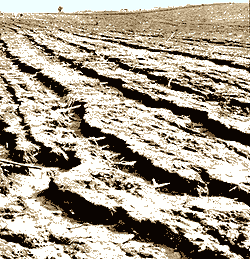|
from 31 dec 2006 blue vol V, #18 |
|
|
Biofuel, climate and energy security, and over-population 
By Dr. Glen Barry, Earth Meanders President, Ecological Internet, Inc.
Exponential growth in population, energy use and consumption are no longer a possibility as humanity is running head on into bio-chemical and ecological limits. The Earth is in ecological overshoot, largely as a result of deadly and unsustainable industrial agriculture that mines soil nutrients and water, allowing populations to burgeon to beyond what is sustainable in the mid to long term. The Earth and human society are undergoing broad-based ecological collapse that far surpasses and is more complex than merely too much greenhouse gas in the atmosphere. Climate change is but one indicator of too many humans overwhelming the planet's ecosystems. If not climate change, it would be desertification or water scarcity or ocean ecosystem collapse or soil erosion/loss of fertility which would herald the deadly implications of humanity's population having exceeded the Earth's carrying capacity. Biofuels are an example of doing what is easy and requires the least societal change - continuing to burn hydrocarbons to power inefficient and inequitable use of energy - rather than what is required. Continuation of advanced human societies in terms of reasonable comfort, leisure and intellectual endeavors requires stabilization and then reduction in human population. There must also be a complete transformation of how humans live and consume, with massive reductions in human per capita consumption of energy. In the race to embrace biofuels I have seen little discussion of the apocalyptic harm agriculture has caused to the environment historically, nor the significant pressures modern agriculture continues to place upon natural life-giving ecosystems. Most terrestrial ecosystem destruction throughout history has resulted from agricultural conversion for farmland. Industrial agriculture causes water scarcity due to excessive irrigation, a toxic cocktail of agricultural chemicals which pervades food chains, and widespread soil erosion, infertility and even desertification. To feed the human enterprise we are already using some 40% of the sun's energy captured by plants and over 40% of the Earth's surface is already comprised of agricultural lands. Around the world the last life giving large natural ecosystems are being razed - in such places as the Amazon and Asian rainforests - to feed an exponentially growing population of six billion (which was one billion 150 years ago and is expected to reach at least nine billion mid-century). Greater agricultural efficiency has always led to more people and less nature. Even supposing biofuels yield an appreciable surplus of energy after subtracting the energy necessary for their production (which is far from certain), there is no way enough biomass could ever be grown to meet a significant portion of current, much less anticipated, world energy needs without causing great environmental harm. Resource intensive agricultural biofuel monocrops will unalterably and perhaps fatally continue the undermining of the biological foundation of life, intensifying existing loss of biodiversity and ecosystems. The Earth's remaining natural and ancient forests will become further endangered as pressures increase to expand agricultural lands and provide more forest biomass - the last thing the world's dwindling forests need. Locally produced biofuels that are certified to have minimized ecological impacts may be an important part a comprehensive program to move local economies towards relocalized sustainability. But on the international agro-industrial scale which they are being proposed they are certain to further greatly degrade land and water ecosystems while prolonging the era of binge like non-sustainable energy consumption and population growth. There are a raft of other social and economic issues that have been given cursory attention at best in the rush to continue an energy profligate and deeply unsustainable way of life. Wait until the first time a region has a widespread drought and society must choose between fuel and food. What of further concentration of agriculture into mammoth conglomerates at the expense of family farms and local communities? How long until genetically modified crops that maximize fuel yield cause genetic pollution and further ecosystem erosion? I do mean to be alarmist. Here are some more energy realities that go beyond kowtowing to the whining, wasteful energy super-consumers. Gas prices are not nearly high enough by an order of magnitude to reflect the cost of fossil fuels to the Earth and society. Climate change is destroying the Planet, and along with deforestation, water scarcity and collapsing oceans will make the Earth uninhabitable. Population levels and their cumulative ecological impacts are so high that they will either be brought down through wise policy or widespread famine as ecosystems collapse. What hope remains lies in enlightened and urgent ecological science based policy-making. Essentially humanity and individuals must decide whether their and their children's continued existence is more important than their SUV and McMansion. We shall all learn to live more simply or we will all die unpleasantly and nearly at once. The unquestioning embrace of biofuel is another example of a solution that exacerbates the problem. While a carefully controlled biofuel industry may have a role to play in meeting local energy needs and averting climate catastrophe, a much greater role will be played by energy efficiency, renewable energy, implementing population controls and learning to live a simpler, much less energy intensive way of life. There is no such thing as sustainable development at this level of population and consumption and an ill-conceived biofuel industry will make things worse. 
|
|||||
|
BLUE is looking for short fiction, extracts of novels, poetry, lyrics,
polemics, opinions, eyewitness accounts, news, features, information and arts
in any form relating to eco cultural- social- spiritual issues, events and
activites (creative and political). Send to Newsdesk. |
